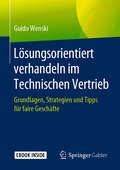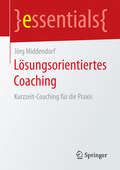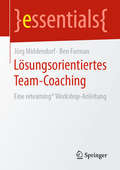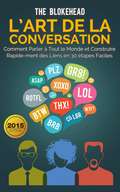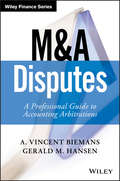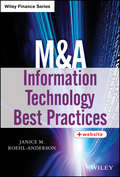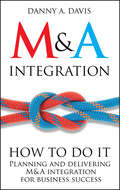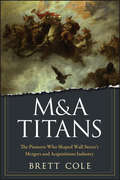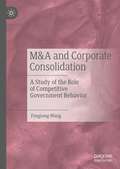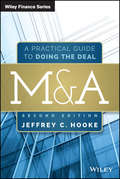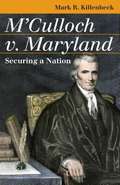- Table View
- List View
Lösungen zum Lehrbuch Finance: Theorie und Anwendungsbeispiele
by Enzo MondelloDieses Lösungsbuch zum Hauptwerk „Finance" unterstützt den Leser beim Bearbeiten der Übungsaufgaben, die ihn zielorientiert bei Erwerb, Auffrischung und Vertiefung der Kenntnisse aus dem Lehrbuch begleiten. Es beinhaltet umfangreichen und nachvollziehbare Lösungswege der Übungsaufgaben des Hauptwerks.
Lösungsorientiert verhandeln im Technischen Vertrieb: Grundlagen, Strategien und Tipps für faire Geschäfte
by Guido WenskiLernen Sie in diesem Buch mehr über das Einmaleins der Verhandlungsführung für Vertriebsingenieure!Investitionsgüter technischer Art werden für den Kunden exklusiv und vor allem individuell angefertigt. Der Umstand bedeutet zwangsläufig ein großes Maß an Erklärungsbedarf. Schließlich wollen Ihre Geschäftspartner genau wissen, welche Anlagen für den industriellen Anwendungsbereich sich für ihre eigenen Bedürfnisse eignen. Dieses Buch widmet sich daher der Verhandlungsführung für Vertriebsingenieure, damit Sie Großanlagen und Maschinen kundenorientiert verkaufen können. Verbessern Sie mit diesem Nachschlagewerk nicht nur Ihr Verhandlungsgeschick, sondern lernen Sie ebenfalls, wie Sie in Verkaufsgesprächen neue Kunden für sich gewinnen.Erfahren Sie alles über die Protagonisten am VerhandlungstischIn diesem Buch über Verhandlungsführung für Vertriebsingenieure werden Sie schrittweise an die Grundlagen des Verhandelns herangeführt. Dazu zählen unter anderem auch die einzelnen Phasen sowie praxisorientierte Verhandlungstipps. Der Autor gibt Ihnen zudem einen Einblick in unsaubere Verhandlungstricks und wie Sie auf diese reagieren sollten. In dem Buch werden die wesentlichen Methoden der Verhandlungsführung für Vertriebsingenieure mittels Beispielen und Erläuterungen genauer definiert. In neun Kapiteln erhalten Sie ein ebenso umfangreiches wie detailliertes Verkaufs- bzw. Vertriebstraining und tauchen tiefer ein in die Verkaufspsychologie. Sie erfahren mehr darüber, wie Sie von Anfang an souverän auftreten und wie hilfreich eine gute Vorbereitung für einen erfolgreichen Abschluss der Verhandlungen ist. Dieses Buch über Verhandlungsführung richtet sich aber nicht nur an Vertriebsingenieure, sondern ebenfalls an Account-Manager, Vertriebsleiter, Mitarbeiter im Marketing und Einkäufer auf Kundenseite.
Lösungsorientiertes Coaching: Kurzzeit-Coaching für die Praxis (essentials)
by Jörg MiddendorfJörg Middendorf stellt in diesem essential die Grundlagen des lösungsfokussierten Coachings sowie einen konkreten Beratungsablauf dar und liefert damit zentrales Handwerkzeug für die Beratung. Zusätzlich regen mehr als 130 Fragen das eigene lösungsfokussierte Denken an. Der Autor spricht damit in erster Linie Coaches und Berater an, die ihre Tätigkeit durch das lösungsorientierte Arbeiten bereichern möchten. Gleichzeitig lassen sich die grundlegenden Prinzipien der lösungsorientierten Arbeit auch gut auf das Führen von Mitarbeitern übertragen. Dementsprechend werden auch Personalverantwortliche viele Anregungen für ihre tägliche Führungspraxis finden.
Lösungsorientiertes Team-Coaching: Eine reteaming® Workshop-Anleitung (essentials)
by Ben Furman Jörg MiddendorfIn diesem essential werden die Grundlagen des lösungsfokussierten Team-Coachings sowie ein konkreter Workshop-Ablauf dargestellt. Das zugrundeliegende reteaming®-Konzept von Ben Furman und Tapani Ahola ist seit Jahren und rund um den Globus praxiserprobt. Der gesamte Beratungsprozess wird Schritt für Schritt dargestellt, sodass Berater und Coaches konkretes Werkzeug zur Durchführung ihrer Team-Coachings erhalten. Zusätzlich werden für jeden Schritt Beispiele für die Visualisierung der notwendigen Flipcharts zur Verfügung gestellt. Die Autoren sprechen damit in erster Linie Coaches und Berater an, die ihre Tätigkeit durch das lösungsorientierte Arbeiten mit Teams bereichern möchten. Gleichzeitig lassen sich die grundlegenden Prinzipien auch gut auf das Führen von Teams übertragen.
L’art de la conversation: Comment parler à tout le monde et construire rapidement des liens en 30 étapes faciles
by The BlokeheadMerci pour votre intérêt pour ce livre, « L’art de la conversation : Comment parler à tout le monde et construire rapidement des liens en 30 étapes faciles » Ce livre contient des informations sur la façon dont vous pouvez développer vos aptitudes à la conversation pour créer des liens et parler à des personnes de tous les horizons. En outre, il contient également 30 conseils sur la façon de créer des liens avec à peu près n'importe qui. Prenez ce livre maintenant!
L’ascension de l’empire
by Ulrich Richard HambuchLe peuple des poètes et des penseurs, qui a été deux fois victime de terribles guerres mondiales dans l’histoire récente, est à nouveau en crise profonde ces jours-ci et se trouve à un carrefour. Au cours des sept dernières années, d’innombrables œuvres brillantes sur le plan analytique, mais sobres, longues et pour la majorité incompréhensibles et donc finalement éphémères ont été produites dans ce contexte, dans lesquelles les auteurs se sont sentis appelés à dévoiler et dénoncer les choses qui nous ont consciemment ou inconsciemment opprimés au cours des dernières décennies. En fin de compte, cependant, tous les auteurs que je connaissais ont échoué à esquisser une alternative holistique et durable à l’état actuel. Il fallait y remédier. Aujourd’hui, je considère cela comme une coïncidence du destin, qui depuis quelques années ne m’a pas permis de poursuivre mon activité habituelle de manière permanente et complète et le destin m’a conduit à partir de maintenant à me consacrer en retraite et en impartialité au sujet de la recherche de la vérité. En tant que personne capable d’agir après un moment d’apprentissage, de réflexion, de ressenti et de pause, je n’ai pu trouver ma place dans aucun parti, entreprise ou lieu en République fédérale d’Allemagne. J’ai donc décidé sans plus attendre de créer pour moi-même cet idéal politique, laïc et spirituel.
L’université en transition
by Bo Göransson Claes BrundeniusLa mondialisation, l'ère de l'information et l'essor de l'économie du savoir transforment profondément les modalités d'acquisition, de diffusion et de transformation du savoir. Il s'ensuit que la production du savoir a graduellement davantage à voir avec la compétitivité économique et y est plus directement liée. Ce nouvel état de fait signifie également que les universités se sentent de plus en plus poussées à s'adapter aux besoins de la société et de l'économie, qui évoluent sans cesse. En particulier, des pressions croissantes s'exercent sur les établissements d'enseignement supérieur et de recherche des pays industrialisés pour qu'ils définissent et affirment leur nouveau rôle au sein du système national d'innovation. Les établissements des pays en développement, quant à eux, sont appelés à définir le rôle qu'ils joueront afin de soutenir les structures émergentes du système d'innovation. Ce livre examine le rôle des universités et des instituts de recherche nationaux dans le développement économique et social. En réunissant des textes rendant compte d'initiatives et d'innovations dans diverses régions du monde, notamment en Chine, en Europe de l'Est, en Amérique latine, en Scandinavie, en Asie du Sud-Est, en Afrique subsaharienne et en Europe de l'Ouest, l'ouvrage brosse un tableau qui est d'actualité et qui intéressera tant les responsables des politiques et les administrateurs d'universités que les leaders économiques et sociaux et les chercheurs. Bo Göransson et Claes Brundenius sont tous deux affiliés au Research Policy Institute de l'Université de Lund, en Suède. M. Göransson est professeur agrégé et coordonnateur du programme LEAP4D, et M. Brundenius est professeur honoraire.
L’écriture freelance – Les secrets d’un prête-plume professionnel
by Richard G Lowe Jr Agnes RuizVous envisagez de devenir un rédacteur indépendant (freelance) et souhaitez faire de l’écriture fantôme. L’écriture fantôme est un travail difficile ! Pourtant, lorsqu’elle est correctement gérée et évaluée, l’écriture fantôme peut être l’une des carrières de rédaction freelance les plus lucratives. Ce livre vous aidera à mener à bien un projet d’écriture fantôme, du contact initial avec un client potentiel jusqu’à la livraison du travail terminé. Les pièges potentiels y sont discutés en détail, ainsi que des solutions et des suggestions. Voici un résumé de ce que vous apprendrez : * Comment évaluer un projet d’écriture fantôme * Comment mettre en place une entreprise d’écriture fantôme * Organiser des réunions avec votre client * Faire des entrevues et des recherches * Pourquoi la communication est particulièrement importante * Comment rédiger un énoncé de travail pour vous protéger et protéger votre client * Comment gérer les révisions inévitables * Comment livrer votre projet final.
M e Terra and Unilever (A)
by Lynn Sharp Paine Priscilla Zogbi Ruth CostasThe case concerns the sale of Mae Terra, one of Brazil's leading brands for packaged organic foods, to the consumer goods giant Unilever in 2017. Working with Unilever management, Mae Terra's CEO Alexandre Borges must determine whether and how to keep Mae Terra's B Certification, which attests to its commitment to having a positive social and environmental impact, and what internal governance mechanisms will enable MaeTerra to maintain its mission, values, and practices even as it is integrated into a large volume-driven multinational whose governance follows standard listed company principles.
M e Terra and Unilever (B)
by Lynn Sharp Paine Mariana Cal Ruth CostasUnilever is making strides to integrate the operations of Mae Terra-one of Brazil's leading brands for packaged organic foods-into its own structures, after acquiring the company in 2017. Mae Terra's CEO, Alexandre Borges, must decide whether to implement his original plan as written into the purchase and sales agreement to create an advisory board to help ensure that the company maintain its mission, values and practices as part of a volume-driven multinational like Unilever- and, if so, how the board will operate and who its members will be. Some executives believe that such a board is not necessary given Unilever's own culture and commitments.
M&A Disputes: A Professional Guide to Accounting Arbitrations
by A. Vincent Biemans Gerald M. HansenNavigate M&A accounting arbitrations with insider perspective M&A Disputes takes you inside the dispute resolution process to help you put together the many "moving parts" necessary to obtain a successful outcome. With deep insight from experts in the field—including valuable advice from the arbitrator's perspective—this book guides you through the entire process to explore the variables at work. The high volume of M&A transactions makes post-closing price adjustment provisions and accounting arbitrations a critical part of doing business. Yet, the field is opaque to non-practitioners and important issues can be easily misunderstood without specific knowledge and experience. A resulting award can make or break a transaction; an intimate understanding of the process's inner working can help you plan your position to the greatest advantage. This book explores the many factors that that contribute to a successful resolution across the entire transaction life cycle from contract negotiation through the dispute phase including due diligence, determination of the target net working capital, conception and closing of the purchase agreement, post-closing negotiation and dispute resolution, the impact of accounting practices, guidance, and documentation as well as relevant auditing concepts, and various facts and circumstances surrounding the target business and the transaction that need to be considered. M&A volume remains high and continues to result in large numbers of current and future post-closing M&A disputes. Clients rely on their attorneys and advisers to guide them through the process and counsel them toward a positive outcome. Those professionals will find that M&A accounting arbitrations carry a range of distinctions that require a specialized knowledge base to navigate correctly. This book provides real-world guidance from experts in the field, with invaluable insight for every stage of the process. Walk through the entire dispute resolution process from arbitrator selection through final award Understand how M&A agreement provisions impact the awarded amount as well as the options available to limit the scope of potential disputes and the "gaming" of the post-closing process by the counterparty Understand the nature of accounting estimates and guidance, their interaction with accounting arbitrations, and how to synthesize facts, circumstances, and GAAP into a persuasive argument to present to the accounting arbitrator Get situation-specific advice for different types of transactions Learn practitioner "dos" and "don'ts" from the arbitrator's perspective M&A Disputes provides transaction parties and their representatives an inside view at the transaction and commonly disputed items through the eyes of the arbitrator to provide them with uniquely valuable insight. In addition to being an invaluable tool for practitioners appearing before an accounting arbitrator, M&A Disputes also provides advice to would-be and experienced arbitrators alike to successfully resolve disputes that can be significant and complex.
M&A Information Technology Best Practices
by Janice M. Roehl-AndersonAdd value to your organization via the mergers & acquisitions IT function As part of Deloitte Consulting, one of the largest mergers and acquisitions (M&A) consulting practice in the world, author Janice Roehl-Anderson reveals in M&A Information Technology Best Practices how companies can effectively and efficiently address the IT aspects of mergers, acquisitions, and divestitures. Filled with best practices for implementing and maintaining systems, this book helps financial and technology executives in every field to add value to their mergers, acquisitions, and/or divestitures via the IT function. Features a companion website containing checklists and templatesIncludes chapters written by Deloitte Consulting senior personnelOutlines best practices with pragmatic insights and proactive strategies Many M&As fail to meet their expectations. Be prepared to succeed with the thorough and proven guidance found in M&A Information Technology Best Practices. This one-stop resource allows participants in these deals to better understand the implications of what they need to do and how
M&A Integration
by Danny A. DavisThe flurry of M&A deals announced in 2011, including AT&T's agreement to acquire T-Mobile USA, ConAgra's proposed bid for Ralcorp, and eBay's acquisition of GSI Commerce, indicate that M&A has returned, and is perhaps headed back to the levels seen before the financial crisis.Most firms of a certain size will turn to it in their search for growth, forcing almost all managers to face up to the challenge of integration at some point their career. For many managers it is often their first, and only time and M&A is high on the list of things that many managers hate. According to many studies, 50 to 75% M&A transactions turn out to be a failure. One of the main reasons for failure is late or wrong integration or bad integration management. There is a significant demand for more information on best practice in Post Merger Integration.This book intends to equip those managers for the task...Danny Davis demonstrates how to handle the post-merger integration process and show how to restructure, consolidate, reduce costs, create efficiencies and perform M&A, from smaller transactions to mega-mergers. The focus is on integration planning and delivery. The book combines a general/strategic view with detailed information of how to actually conduct a Post Merger Integration via very practical tools and check lists that will prove essential in delivering change before, during and after transactions as well as to ensure their success.
M&A Legal Context: Basic Framework for Corporate Governance
by James Quinn Carliss Y. Baldwin Constance E. BagleyStudents are introduced to the basic framework for corporate governance. Begins by describing the complex role of the modern corporation, then proceeds by discussing the fiduciary duties to which a board of trustees is bound (duty of care, duty of loyalty, etc.), and concludes by proposing seven factors officers and directors should consider when overseeing the sale or purchase of a company. Recounts the precedential case Smith vs. Van Gorkom.
M&A Legal Context: Hostile Takeovers
by James Quinn Carliss Y. Baldwin Constance E. BagleyIntroduces students to the main tactical maneuvers used by hostile bidders, including bear hugs, proxy fights, tender offers, and toeholds. Also describes how, in the United States, tender offers are regulated by the federal government via the Williams Act.
M&A Legal Context: Standards Related to the Sale or Purchase of a Company
by James Quinn Carliss Y. Baldwin Constance E. BagleyIntroduces students to the legal standards affecting officers and directors when selling or purchasing a company. Provides a practical understanding of the Revlon Standard, the Securities and Exchange Act of 1934, Rule 10b-5, and the legal criteria for a cause of action for securities fraud. Recounts three precedential cases decided by the Delaware Supreme Court.
M&A Titans: The Pioneers Who Shaped Wall Street's Mergers and Acquisitions Industry
by Brett ColeThis book focuses on the 11 men, lawyers and bankers, who are responsible for the creation of Wall Street's merger industry. It specifically concentrates on the events and personalities who dominated Wall Street during the takeover battles of the 1970s and 1980s. Lawyers Joe Flom and Marty Lipton, the godfathers of modern M&A, educated bankers on takeover laws and regulations as well as tactics. Flom and Lipton were also superlative businessmen who built their own firms to become Wall Street powerhouses. The two men drew into their orbit a circle of bankers. Felix Rohatyn, Ira Harris, Steve Friedman, Geoff Boisi, Eric Gleacher and Bruce Wasserstein were close to Lipton. Robert Greenhill and Joe Perella were close to Flom. M&A Titans provides insight into the culture of the different investment banks and how each of the bankers influenced the firms they worked in as they became more powerful. Some such as Gleacher, Harris, Wasserstein, Perella and Greenhill clashed with the men running their firms and left. Others such as Friedman and Boisi stayed and profoundly influenced how the firm did business. The career of Michael Milken, perhaps the notorious name on Wall Street in the 1980s, is also examined as well as the actions and tactics of his firm, Drexel Burnham Lambert. Milken and Drexel paved the way for the growth of private equity and helped popularize attacks on management by investors such as Boone Pickens and Carl Icahn.
M&A and Corporate Consolidation: A Study of the Role of Competitive Government Behavior
by Fengrong WangThis book constructs an innovative theoretical analysis framework for corporate consolidation through M&A under the condition of government competition during the transition period. Under the condition of transitional economy, the government is an important agent in economic development. Government behaviors, especially government competitions, are institutional variables that affect enterprise behaviors and corporate consolidation. Based on the perspective of local government competition, starting from the essential problems of China's enterprise M&A during the transition period, and taking “the existence of M&A waves-the occurrence mechanism of M&A under government competition-the process of corporate consolidation under government competition—the macro and micro effects of M&A” as the main line, this book reveals the mechanism and effects of enterprise M&A on the evolution of industrial economic structure and regional economic structure under the paradigm of government competition. At the same time, taking “the motivations for government competition-conducts of government competition-effects of government competition” as the hidden line, the path of government competition and its impact mechanism are investigated. Relevant analysis of government competition is embodied in the logical framework of M&A and corporate consolidation.
M&A: A Practical Guide to Doing the Deal (Wiley Finance #36)
by Jeffrey C. HookeThe comprehensive M&A guide, updated to reflect the latest changes in the M&A environment M&A, Second Edition provides a practical primer on mergers and acquisitions for a broad base of individuals numbering in the hundreds of thousands: Investment bankers involved with mergers and acquisitions (M&A). Equity analysts at hedge funds, risk arbitrage funds, pension funds, and banks, who invest in firms engaged in M&A. Private equity professionals at buyout funds, venture capital funds, and hedge funds, who routinely buy and sell companies. Corporate executives and business development professionals. Institutional loan officers working with M&A and buyout transactions. Business students at colleges and graduate business schools. Investor relations professionals at corporations and public relations firms. Lawyers who work with corporate clients on M&A-related legal, financial, and tax matters. Independent public accounting firms that review M&A accounting. Government regulators Sophisticated individual investors Its comprehensive approach covers each step in the process, from finding an opportunity, to analyzing the potential, to closing the deal, with new coverage of private equity funds and international transactions. This updated second edition also includes information on emerging markets, natural resource valuation, hostile takeovers, special deals, and more, plus new examples and anecdotes taken from more current events. Additional illustrations and charts help readers quickly grasp the complex information, providing a complete reference easily accessible by anyone involved in M&A. The mergers and acquisitions environment has changed in the thirteen years since M&A was initially published, creating a tremendous need for authoritative M&A guidance from a banker's perspective. This M&A update fills that need by providing the characteristic expert guidance in clear, concise language, complete with the most up-to-date information. Discover where M&A fits into different corporate growth strategies, and the unique merits it confers Delineate clear metrics for determining risk, valuation, and optimal size of potential acquisitions Gain deeper insight into the fundamentals of negotiation, due diligence, and structuring Understand the best time to sell, the best way to sell, and the process of the sale itself In the past decade, the dollar value of M&A deals has jumped ten-fold, and the number of individuals involved has expanded considerably. More and more executives, analysts, and bankers need to get up-to-date on the mechanics of M&A, without wading through volume after volume of dense, legalistic jargon. Finally, M&A is back – providing a complete reference to the current state of the M&A environment.
M'Culloch v. Maryland: Securing a Nation (Landmark Law Cases & American Society Series)
by Mark R. KillenbeckFederalism--including its meanings and limits--remains one of the most contested principles in constitutional law. To fully understand its importance, we must turn to a landmark decision nearly two centuries old. M'Culloch v. Maryland (1819) is widely regarded as the Supreme Court's most important and influential decision-one that essentially defined the nature and scope of federal authority and its relationship to the states. Mark Killenbeck's sharply insightful study helps us understand why. Killenbeck recounts how the cashier of the Baltimore branch of the Second Bank of the United States refused to pay Maryland's tax on the bank and how that act precipitated a showdown in the Supreme Court, which addressed two questions: whether the U.S. Congress had the authority to establish a national bank and whether Maryland's tax on the bank was barred by the Constitution. In one of Chief Justice John Marshall's most famous opinions, the Court unanimously answered yes to both, authorizing the federal government to exercise powers not expressly articulated in the Constitution--and setting an alarming precedent for states--rights advocates.
M-KOPA: Empowering Lives
by V. Kasturi Rangan Pippa Tubman Armerding Wale LawalThe Pay As You Go solar power company in East Africa had sales of $71 million in 2019. It wished to grow to $300 million by 2025. M-KOPA, founded by three entrepreneurs in 2011, had grown nicely in Kenya and Uganda to reach nearly 750,000 households with an innovative direct sales force model. Jesse Moore, the founder, wished to scale the company through organic growth as well as geographical expansion into Nigeria. The strategy called for decisions on product/service offerings and go-to-market options. On the product side the company had increasingly migrated to larger in-home connected electronic and electrical devices. It had to decide how much further to go. On the go-to-market side its innovative Direct Service Representative network was hard to create and manage, and it had to think if there were viable alternatives.
M-Lab: Enabling Innovation at Mitsubishi Corporation
by Krishna G. Palepu Allison M. CiechanoverM-Lab's founding goals were to infuse an innovation mindset into Mitsubishi Corporation; to catalyze new business opportunities; and to enable a dialogue between Japanese business and Silicon Valley. M-Lab housed representatives from each of Mitsubishi Corporation's verticals who were joined by executives from other prominent Japanese corporations. While M-Lab was still early in its history, its leader, Tsunehiko Yanagihara, was pleased with its progress: the ecosystem was fertile with research on cutting edge technology; resident executives collaborated across industries on a daily basis; several investments and proof of concept projects were underway; staff had launched an innovation learning program; and soon, an on-site retail-tech accelerator would welcome its first participants. As some of the projects born out of M-Lab now evolved to commercial businesses, Yanagihara saw yet a new role for M-Lab - that of startup advisor. How might he harness Silicon Valley insights on scaling technology ventures and feed them back to the young ventures made possible by M-Lab? And how might he help those now responsible for implementing and executing at these new businesses apply these learnings to the hurdles they faced?
M-TRONICS (A)
by Joseph L. Bower Lynda M. ApplegateThe new CEO of a small manufacturing firm pursues growth through the launch of Entrepreneurial Subsidiaries. While the firm grows revenues from $600 million to over $2 billion in 10 years, problems surface as the subsidiaries are integrated into the established business

